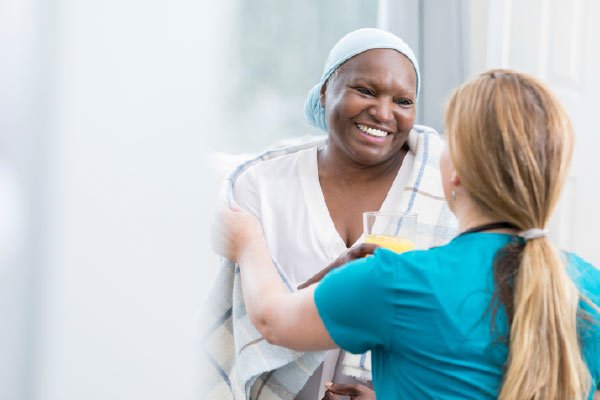According to the American Cancer Society, in 2021, more than 1.9 million people will be diagnosed with cancer in the United States. Cancer treatment options vary, but most people have a combination of treatments, such as chemotherapy and/or radiation with surgery. For many cancer patients, treatment involves both hospital stays and regular outpatient visits to a clinic for chemotherapy. As options continue to advance, some cancer treatments can even be done at home. This is usually the case for oral treatments, such as pills, capsules, tablets, and liquids, or topical treatments that are rubbed on the skin. Sometimes, even IV or injectable treatments can be given at home, too.
Regardless of the course of treatment following a cancer diagnosis, there are frequently side effects that can make day-to-day life challenging. The good news is that in-home care help from a professional care provider, like the services offered through referrals from American, Advocate, and Whitsyms In-Home Care, can offer the assistance needed to make day-to-day life more comfortable -- even when cancer treatments become overwhelming.
What Is Home Care?
It’s important to note that “home care” is often used as a blanket term to refer to different types of care provided in the home. Following is a breakdown of the types of home care services that can be beneficial to a person undergoing cancer treatment:
- Personal care: These services focus on helping people with daily activities, such as bathing, dressing, running errands, or housekeeping. Personal care can provide much-needed assistance at home for those feeling weak or ill from chemotherapy or following surgery. Care providers can also run errands, such as picking up medications or groceries.
- Home health care: This type of care focuses on what’s known as “skilled care services” that are provided by licensed health care professionals, such as registered nurses. For a cancer patient, these services might include nursing visits for injections or physical therapy following surgery.
- Palliative care: When cancer is life-limiting, palliative care services can help keep the person comfortable and provide respite for family caregivers.
At American, Advocate, and Whitsyms In-Home Care, we know that home care helps many people live fuller, more comfortable lives as they receive treatment for cancer. Our referred care providers are dedicated to helping those recovering from or being treated for cancer in the following ways:
- Bathing
- Dressing
- Using the restroom
- Transferring
- Walking assistance
- Continence care and feeding (as needed by the patient and recommended by their physician)
- Medication reminders
- Running errands
- Light housekeeping
- Accompanying to doctors’ appointments
- Monitoring for behavioral changes
- Helping to maintain safety
- Assistance with exercises
- Skilled nursing care
Contact us any time to learn more about how our referred care providers can help you or someone you love following a cancer diagnosis or treatment. Or, simply click on the links below to find the location nearest you:
- American In-Home Care – Serving North, Central, and West Coast of Florida
- Advocate In-Home Care – Serving Southeast and Southwest Florida
- Whitsyms In-Home Care – Serving Southeast and Southwest Florida
State of Florida License and Registration Numbers: 30211518, 30211651, 30211295, 30211390, 30210978, 30211293, 30211382, 30211504, 30211733, 30211535, 30211531, 30211710, 30211709, 30211045, 5661


